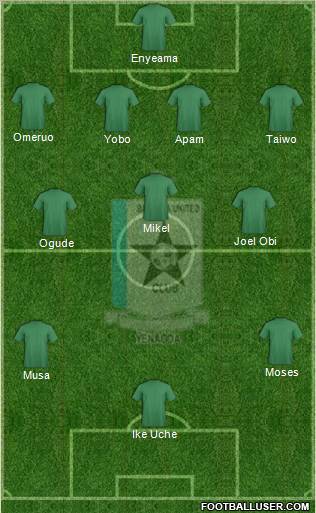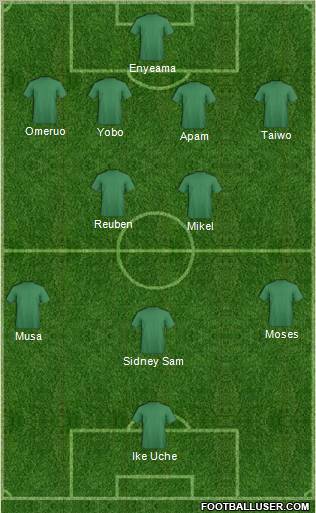I finally succumbed to pressure from a friend to share my views on what I consider the ideal tactical organization of the Super Eagles, based on the players currently available to national team selectors.
In doing this I should point out that this is entirely conceptual and assumes that everybody is healthy, which in reality is the exception rather than the rule.
The concept itself is based on long standing weaknesses observed in the Super Eagles that predate the current coach and team.
The Players:
Based on multiple games I have seen, match reports, etc, these are in my considered opinion, Nigeria's best players, give or take a few:
Goalkeepers: Vincent Enyeama, Austin Ejide, Carl Ikeme
Right Back: Kenneth Omeruo, Daniel Adejo, Obinna Nwachukwu*
Left Back: Taiye Taiwo, Uwa Echiejile
Center Back: Joseph Yobo, Onyekachi Apam, Efe Ambrose, Azubuike Egwueke, Michael Odibe, Godfrey Oboabona.
Central Midfield: John Mikel Obi, Joel Obi, Fengor Ogude, Gabriel Reuben, Izunna Uzochukwu, Onazi Ogenyi.
Central Attacking Midfield: Nosa Igiebor, Sidney Sam*, John Chibuike
Wide Midfield/Forward: Victor Moses, Ahmed Musa, John Utaka, Ejike Uzoenyi
Central Attack: Ike Uche, Chinedu Obasi, Osaze Odemnwigie, Emmanuel Emenike, Ideye Brown
The Formation/Tactical Organization:
Two formations are proposed to address the two broad needs for balance and an attacking game; the 4-3-2-1 and the 4-2-3-1 respectively.
The 4-3-2-1 is proposed as the primary formation to address the need for balance in the Super Eagles, a weakness that crippled the team under Siasia and remains today under Keshi.
The main distinguishing factor here is the use of three central midfielders- a
trivote to control the center of the field and shephard the opponent's attack out wide.
John Mikel Obi retains his Chelsea role in front of the central defence to maximize his positional awareness and tactical discipline, as well as enable the team controlled possession. In addition, he has the role of also influencing attacking play from his deep position, using his long range passing skills.
In this role, Izunna Uzochukwu will compete directly with him, being familiar with a similar role at Midjtylland FC's 4-1-4-1 or 4-3-3.
On either side of Mikel are two box-to-box midfielders, who are expected to contribute to both attacking play as well as defence. Joel Obi, Fengor Ogude, Gabriel Reuben, and Onazi Ogenyi will compete for the two spots.
In attack, primary creative play will come from the wide midfielders, which means that an important objective of the build up phase is to isolate the opposing fullbacks for the wide players to run at them. Overall, creative play from central midfield is primarly a function of movement and passing, and not the dribble. The central midfielders are expected to take turns in breaking into the box as 'arrivals'.
It also means that beyond the three central midfielders, free roles are assigned to the three attacking players, who also form the first two lines in the pressing system in the non-possession phase. However behind them the game is structured and based on positional discipline.
The wide midfielders will also take turns to switch to the center (central winger) to recieve the ball and unbalance the opponent, with the corresponding fullback pushing up to create an outlet on the flanks, and the central midfielder on that side moving laterally to provide cover.
In central attack, the key quality required is multi-functionality, speed, and the movement to find space between the lines. The role requires constant switching with the wide midfielders, which means the central striker must have the versatility to play out wide on both the left and right, as well as in a supporting role. The central striker is thus required to have very good technical skills, speed, close control and the ability to play with back to goal, as well as on the shoulder of the last defender. In otherwords, movement and technical skills is the main denominator rather than just sheer power.
Based on this, Victor Anichebe is not considered a priority. However, both Oba Martins and Anthony Ujah will remain in the frame as they seek to revive their careers.
In a 4-2-3-1, a double pivot is created in central midfield with Mikel Obi and a defensive midfielder, like Reuben.
Between the two wide midfielders is a central attacking midfielder, with Igiebor, Chibuike and Sidney Sam competing for the one spot. Nosa Igiebor will need to improve his intensity to make an impact at Betis and thus the Super Eagles. As a result of this, he tends to drift out of games,
John Chibuike (Rosenberg) has a good left foot, a good eye for a pass and ability to get in the box as an arrival. However his lack of pace will be a constraint.
Sidney Sam at Leverkusen plays at a higher level than the others. While he may not have expressed interest to play for Nigeria, the reality is that he is available and his window for joining the German national team is closing fast with so many options emerging for Jorgi Loew. I believe that a determined effort to recruit him for the Nigeria project has a good chance of success, especially if handled professionally.
Defence:
By far the most number of goals conceded by Nigeria in open play has come from structural weaknesses in midfield, especially in defending the diagonal run or pass from an opponent attacking the inside of the fullback, or the zone between the fullback and the central defence. At the same time, inability to track runners behind the central midfielders, or press the ball high upfield, has on several occassions gifted the opponent time and space to pick a pass through the defence. Addressing these weaknesses is the rationale behinde the use of a
trivote in midfield.
At the same time the quality of defenders available remains a huge problem, and Onyekachi Apam's return should be a major plus.
Celtic's Efe Ambrose is listed in central defence where his ball skills are best utilized in playing out of defence, rather than as a makeshift right back.
Michael Odibe is listed on account of his continued progress in rebuilding his career at Ukraine where he seems to have found some semblance of stability on loan to Dnpro. In my opinion this is a talented player, who is strong aerially as well as on the ground in terms of positioning.
Of the two central defenders from the NPL, Egwuekwe has the greater prospect in my opinion; strong in the air and especially fast for such a big man. The problem is his positioning and ability to read movements of opposing players, which so far is not improving. I am yet to be convinced that based on his talent and the experience of the NPL, Egwuekwe is in a position to be a starter in the Super Eagles.
Long term, I would keep a keen eye out for the young Tiago Ilori at the famed Sporting Lisbon youth academy, who is starting to break into the first team and is managed by super agent Pini Zahavi.
But by far the biggest problem in defence remains in the fullback positions, especially at left back. While he has his weaknesses, Taiye Taiwo remains in my opinion the best of the options available, and has the advantage of playing at a higher level than any of his competitors.
At right back, Kenneth Omeruo has shown enough consistency at ADO Den Haag to merit an invitation to compete with Daniel Adejo who has consistently done well at Reggiana and Obinna Nwachukwu, a right winger with Heartland, whom I believe will be a good prospect for the position, in the same tradition as convereted fullbacks like Sylvanus Okpalla, Ikechukwu Ofoge and Abdul Sule before him.
Why Obinna? He has all the physical tools to be a top right back- tall and rangy, speed going forward or in recovery, is strong on the tackle as well as aerially, and has good crossing ability. The rest is to school him on the art of defending...
The defensive system involves three lines of pressing (within zones), begining with the central striker who shows pressure, but retreats, allowing the wide players to press high behind him. The key to this is choosing the time and place to press the ball and not merely running at the opponent hahazardly. This has the additional quality of suprise.
Of the three central midfielders, the player in the middle (Mikel) should 'hold', relying on his reading of the game more than on high pressing. He has the additional responsibility of playing as the third central defender as the need arises.
Goalkeeping:
The lack of first team football by Vincent Enyeama (until recently) and his continued use throughout this period has combined to make the goalkeeping position the least competitive in the Super Eagles since Berti Vogts made the decision to start Austin Ejide in 2008.
In the absence of any real competitor from the domestic game, Carl Ikeme is listed in expectation that his experience from the English Nationwide will help generate a stiff three way competition.
At the same time, the CHAN can be used to focus on developing young goalkeepers with prospects for the future.
Role of the Domestic League:
The domestic league will be used to scout for players, but only in areas of weakness of the Super Eagles, as opposed to the current approach which is more broad based. The main difference is that the CHAN competition will be the key starting point in the process of getting an invitation to the Super Eagles. In effect, players from the NPL will be assessed on the basis of performance in the CHAN, with greater focus on areas of weaknesses in the Super Eagles such as the fullback positions, except of course if any exceptional players were to suddenly emerge.
This approach is a recognition of the fact that while players from the NPL may be as naturally talented as the Euro-based players, they play at a level and under a training curriculum that makes them uncompetitive for international football without considerable additional help.
The reality is that the NPL, especially in terms of quality of players, is not at the level it was when Clemence Westerhof took a predominantly homebased team to the Nations Cup final in 1990.

